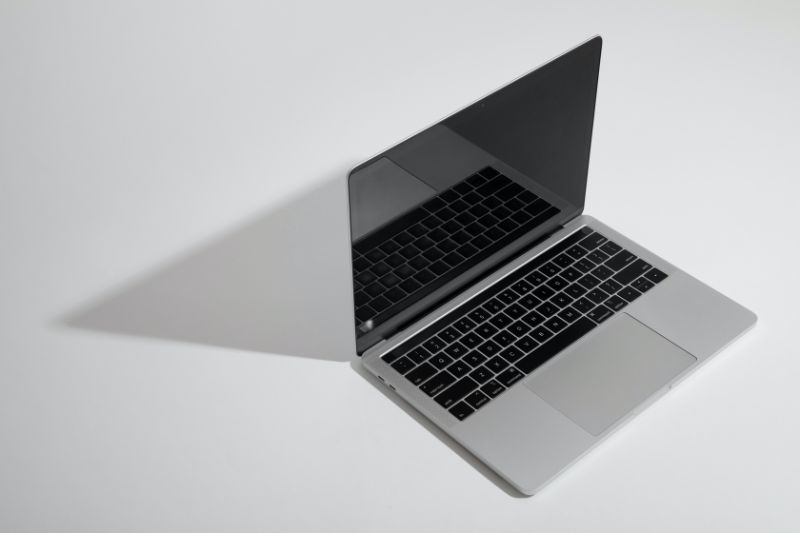
In order to maintain a laptop in optimal working condition, it is important to clean it regularly. Dust and dirt particles can accumulate on the laptop’s exterior and interior, causing issues with the laptop’s performance and increasing the risk of hardware damage. Cleaning the laptop can also help to improve its overall lifespan.
Content of the page
It is also better to have a clean keyboard on your laptop, you may want to check our guide on how to clean it.
Cleaning a laptop is a relatively simple process, but it is important to take the right precautions to ensure that the laptop is not damaged. This article provides an overview of the importance of regular laptop cleaning, how to prepare the laptop for cleaning, and how to clean the laptop’s exterior and interior.
Understanding the Impact of Dust and Dirt Accumulation
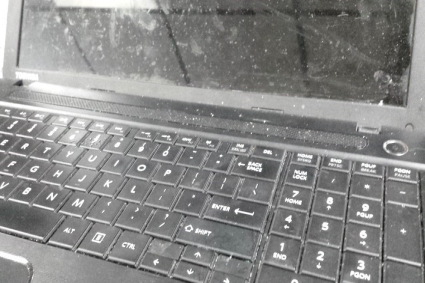
| Issues Caused by Dust and Dirt Accumulation |
|---|
| Reduced performance |
| Overheating |
| Increased wear and tear |
| Permanent damage to components |
| Difficulty in typing |
| Reduced airflow |
| Benefits of Regular Cleaning |
|---|
| Improved performance |
| Prolonged lifespan |
| Reduction in wear and tear |
| Prevention of permanent damage |
| Enhanced typing experience |
| Better airflow |
Dust and dirt particles can cause a variety of issues with a laptop’s hardware, including reduced performance, overheating, and increased wear and tear. Over time, dust and dirt particles can also cause permanent damage to the laptop’s components, including the CPU and motherboard.
Dust and dirt particles can accumulate on the laptop’s exterior, such as the screen, keyboard, and casing. This can cause the laptop to appear dirty and can also make it difficult to type. Additionally, dust and dirt particles can accumulate on the laptop’s interior, such as the fans, vents, and other components, reducing the airflow and causing the laptop to overheat.
Cleaning the laptop regularly can help to reduce the impact of dust and dirt accumulation and can help to improve the laptop’s performance. Additionally, cleaning the laptop regularly can help to prolong its lifespan by reducing wear and tear on the components.
Prolonging the Lifespan of Your Laptop
Cleaning your laptop on a regular basis can help to prolong its lifespan by reducing the wear and tear on its components. Dirt and dust particles can accumulate over time and can cause permanent damage to the laptop’s components, such as the CPU and motherboard. Additionally, dirt and dust particles can reduce the airflow, causing the laptop to overheat and increasing the wear and tear on the components.
Cleaning the laptop regularly can help to reduce the accumulation of dirt and dust particles and can help to reduce the risk of damage to the components. Additionally, cleaning the laptop regularly can help to improve its performance, since dust and dirt particles can reduce the laptop’s performance.
Preparing Your Laptop for Cleaning
Before cleaning a laptop, it is important to take the necessary steps to prepare the laptop for cleaning. This includes gathering the necessary cleaning tools and taking safety precautions.
Gathering the Necessary Tools
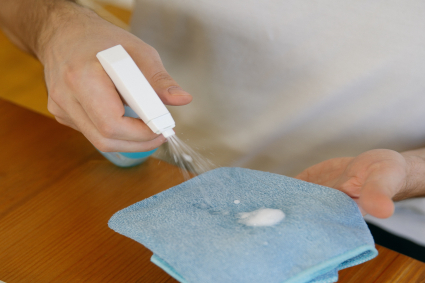
Before cleaning a laptop, it is important to gather the necessary tools. This includes:
- A soft, lint-free cloth
- Compressed air
- A small vacuum cleaner
- Cleaning wipes or a cleaning solution
It is important to use the right tools when cleaning a laptop. A soft, lint-free cloth should be used to clean the laptop’s exterior, while compressed air can be used to remove dust and dirt particles from the laptop’s interior. A small vacuum cleaner can also be used to remove dust and dirt particles from the laptop’s interior. Cleaning wipes or a cleaning solution should be used to clean the laptop’s exterior.
Taking Safety Precautions
Before cleaning a laptop, it is important to take safety precautions. This includes unplugging the laptop from any power sources, such as a power outlet or a laptop charger, and removing the battery. Additionally, it is important to avoid spraying any liquids directly onto the laptop.
External Cleaning of Your Laptop
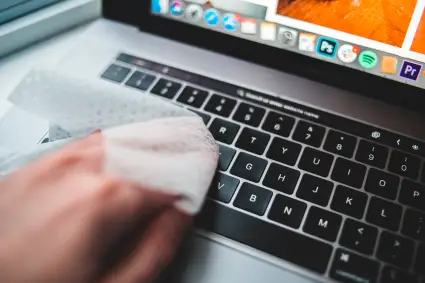
Once the laptop has been prepared for cleaning, it is time to start cleaning the laptop’s exterior. This includes cleaning the laptop’s screen, keyboard, and casing.
Cleaning the Laptop Screen
To clean the laptop’s screen, use a soft, lint-free cloth and a cleaning solution. Gently wipe the screen with the cloth and cleaning solution to remove any dirt and dust particles. Be sure to avoid spraying any liquids directly onto the laptop’s screen.
Cleaning the Keyboard and Touchpad
To clean the laptop’s keyboard and touchpad, use a soft, lint-free cloth and a cleaning solution. Gently wipe the keyboard and touchpad with the cloth and cleaning solution to remove any dirt and dust particles. Be sure to avoid spraying any liquids directly onto the laptop’s keyboard or touchpad.
Cleaning the Laptop Casing
To clean the laptop’s casing, use a soft, lint-free cloth and a cleaning solution. Gently wipe the casing with the cloth and cleaning solution to remove any dirt and dust particles. Be sure to avoid spraying any liquids directly onto the laptop’s casing.
Internal Cleaning of Your Laptop
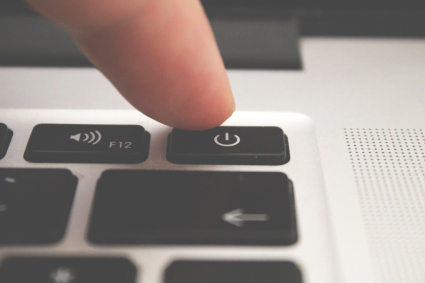
Cleaning the inside of your laptop is the most important part of the process and should be done carefully and with caution. First, shut down the laptop and disconnect it from any power source. Removing the battery will help to avoid any potential shocks or electric discharges that may cause harm to the internal components of your laptop. Next, use a can of compressed air to remove any dust and debris from the laptop’s vents and fans. Be sure to hold the can upright and at a distance of about 10 inches (25 cm) from the laptop’s vents to ensure that no liquid is sprayed inside. Make sure to clean any other components of the laptop, such as the keyboard, internal fans, and other small components, using a soft, lint-free cloth.
Shutting Down and Disconnecting the Laptop
Before starting the cleaning process, it is important to shut down and disconnect your laptop from any power source. This will help to avoid any potential shocks or electric discharges that may cause harm to the internal components of your laptop. Additionally, it is recommended to remove the laptop’s battery to ensure that no power is supplied to the internal components.
Removing Dust from the Vents and Fans
Once the laptop has been shut down and disconnected from any power source, use a can of compressed air to blow out any dust and debris from the laptop’s vents and fans. It is important to hold the can upright and at a distance of about 10 inches (25 cm) from the laptop’s vents to ensure that no liquid is sprayed inside. Make sure to blow out any other components of the laptop, such as the keyboard, internal fans, and other small components.
Cleaning the Keyboard and Internal Components
Using a soft, lint-free cloth, gently wipe down the laptop’s keyboard and internal components. Be sure to pay special attention to any areas that may be prone to dust and debris accumulation. Additionally, use the compressed air to blow out any dust and debris that may have built up inside the laptop’s keyboard or other small components.
Proper Cleaning Techniques for Specific Laptop Models
Cleaning a MacBook
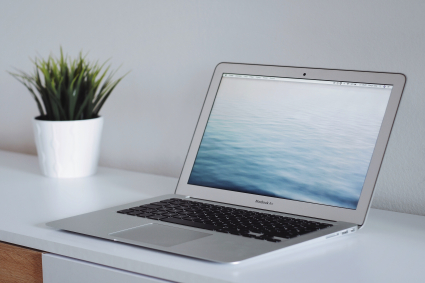
| Shut down and disconnect from power sources |
| Remove battery |
| Use compressed air to remove dust and debris from vents and fans |
| Wipe keyboard and internal components with a soft cloth |
| Use a mild cleaning solution for case and screen |
Cleaning a MacBook can be a delicate process, as the internal components of the laptop are sensitive to liquid and dust. To begin, shut down the laptop and disconnect it from any power sources. Remove the laptop’s battery and use a can of compressed air to blow out any dust and debris from the laptop’s vents and fans. Be sure to hold the can upright and at a distance of about 10 inches (25 cm) from the laptop’s vents to ensure that no liquid is sprayed inside. Then, use a soft, lint-free cloth to wipe down the laptop’s keyboard and internal components. Finally, use a mild cleaning solution, such as isopropyl alcohol, to wipe down the laptop’s case and screen.
Cleaning a Windows Laptop
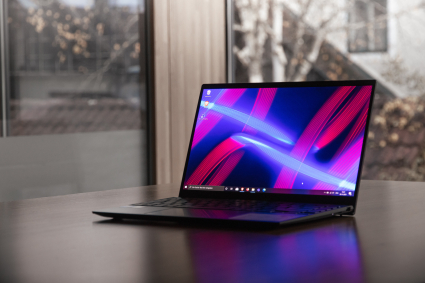
| Shut down and disconnect from power sources |
| Remove battery |
| Use compressed air to remove dust and debris from vents and fans |
| Wipe keyboard and internal components with a soft cloth |
| Use a mild cleaning solution for case and screen |
| Clean trackpad, ports, and small openings with a cotton swab |
Cleaning a Windows laptop is similar to cleaning a MacBook, but may require a few additional steps. To begin, shut down the laptop and disconnect it from any power sources. Remove the laptop’s battery and use a can of compressed air to blow out any dust and debris from the laptop’s vents and fans. Be sure to hold the can upright and at a distance of about 10 inches (25 cm) from the laptop’s vents to ensure that no liquid is sprayed inside. Then, use a soft, lint-free cloth to wipe down the laptop’s keyboard and internal components. Additionally, use a mild cleaning solution, such as isopropyl alcohol, to wipe down the laptop’s case and screen. Finally, use a cotton swab and a mild cleaning solution to clean the laptop’s trackpad, ports, and other small openings.
Maintaining a Clean Laptop Environment
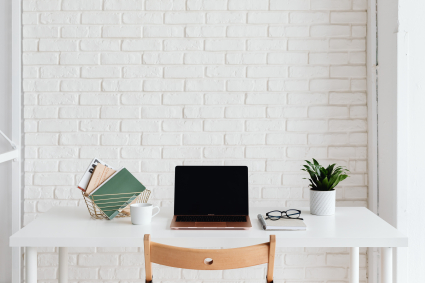
Creating a Dust-Free Workspace
Creating a dust-free workspace for your laptop is essential for keeping the internal components clean and free from dust and debris. To begin, make sure to keep your workspace free from dust and debris by regularly vacuuming and dusting the area. Additionally, try to keep the area well-ventilated to help reduce the accumulation of dust and debris. Finally, consider investing in a laptop cooling pad to help keep your laptop at a safe operating temperature.
Using Laptop Cleaning Accessories
Using laptop cleaning accessories can help to make the cleaning process easier and more efficient. There are a variety of laptop cleaning kits available on the market, which typically include a can of compressed air, cleaning solution, cleaning cloths, and other accessories. Additionally, there are a variety of laptop cleaning wipes available which can be used to quickly and easily clean the laptop’s screen, case, and other components.
Additional Tips for Laptop Maintenance
| Regular software updates and virus scans |
| Proper storage and carrying methods |
| Optimizing laptop performance |
Regular Software Updates and Virus Scans
In addition to cleaning the laptop on a regular basis, it is important to keep the laptop’s software up-to-date and to regularly run virus scans. Keeping the laptop’s software up-to-date will help to prevent any potential security threats or performance issues. Additionally, running regular virus scans will help to ensure that any malicious software is detected and removed from the laptop before it has a chance to cause any harm.
Proper Storage and Carrying Methods
It is important to use proper storage and carrying methods when transporting your laptop. Make sure to store the laptop in a padded bag or case to protect it from any bumps or drops that may occur while carrying it. Additionally, it is important to avoid exposing the laptop to extreme temperatures and to make sure that the laptop is properly ventilated when in use.
Optimizing Laptop Performance
Optimizing the performance of your laptop is essential for ensuring that the laptop runs at its best. To begin, make sure to delete any unnecessary files or programs that may be taking up valuable storage space. Additionally, consider disabling any unnecessary background programs or services that may be slowing down the laptop’s performance. Finally, use a laptop cleaning program to help remove any unwanted files or programs that may be causing performance issues.
Conclusion
Cleaning your laptop is an important part of regular laptop maintenance. Proper cleaning techniques will help to keep the laptop’s internal components free from dust and debris, which can cause performance issues and even permanent damage. Additionally, it is important to maintain a dust-free workspace and use proper storage and carrying methods to protect the laptop from any potential harm. Finally, it is essential to keep the laptop’s software up-to-date and to regularly run virus scans in order to ensure the laptop’s security.
